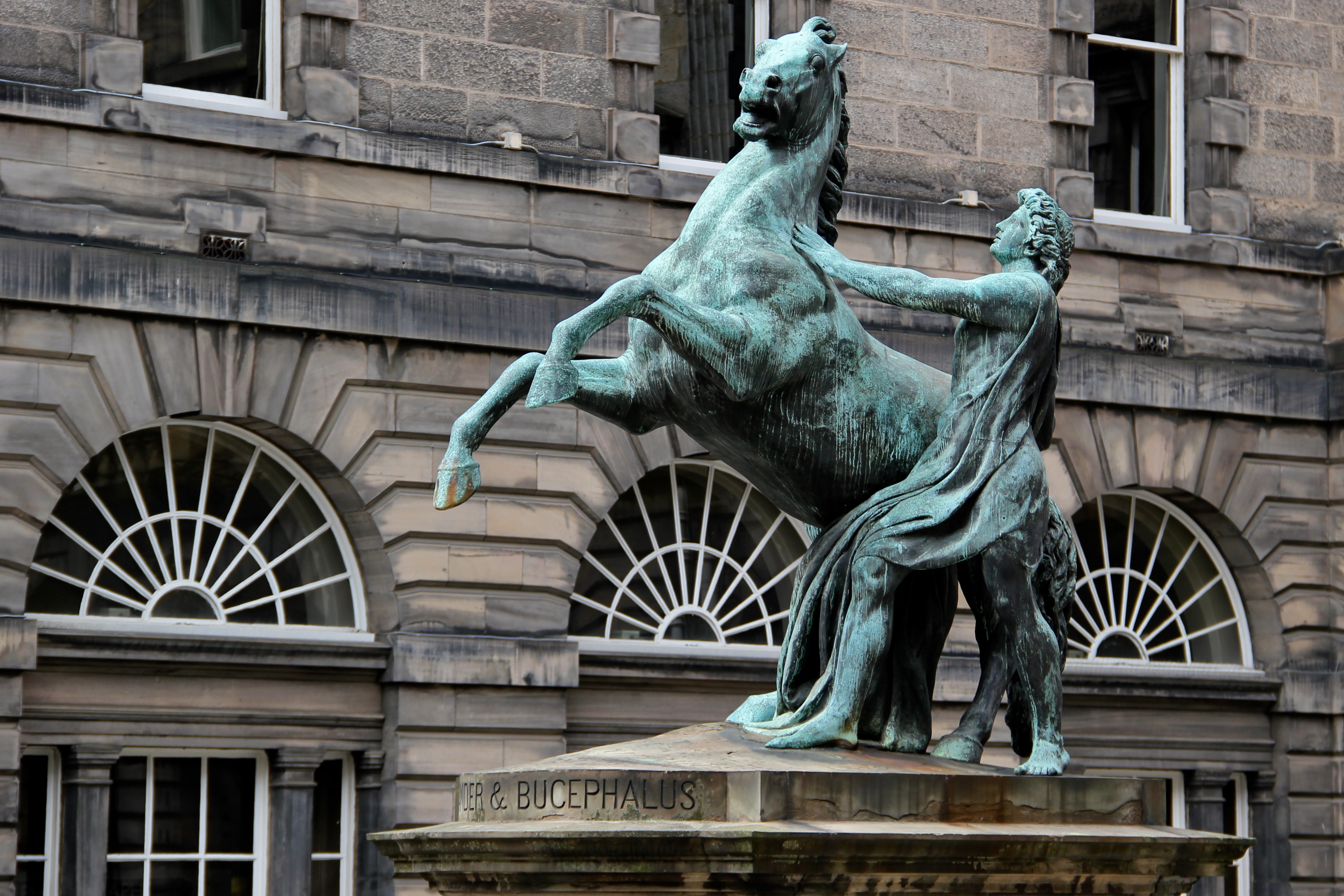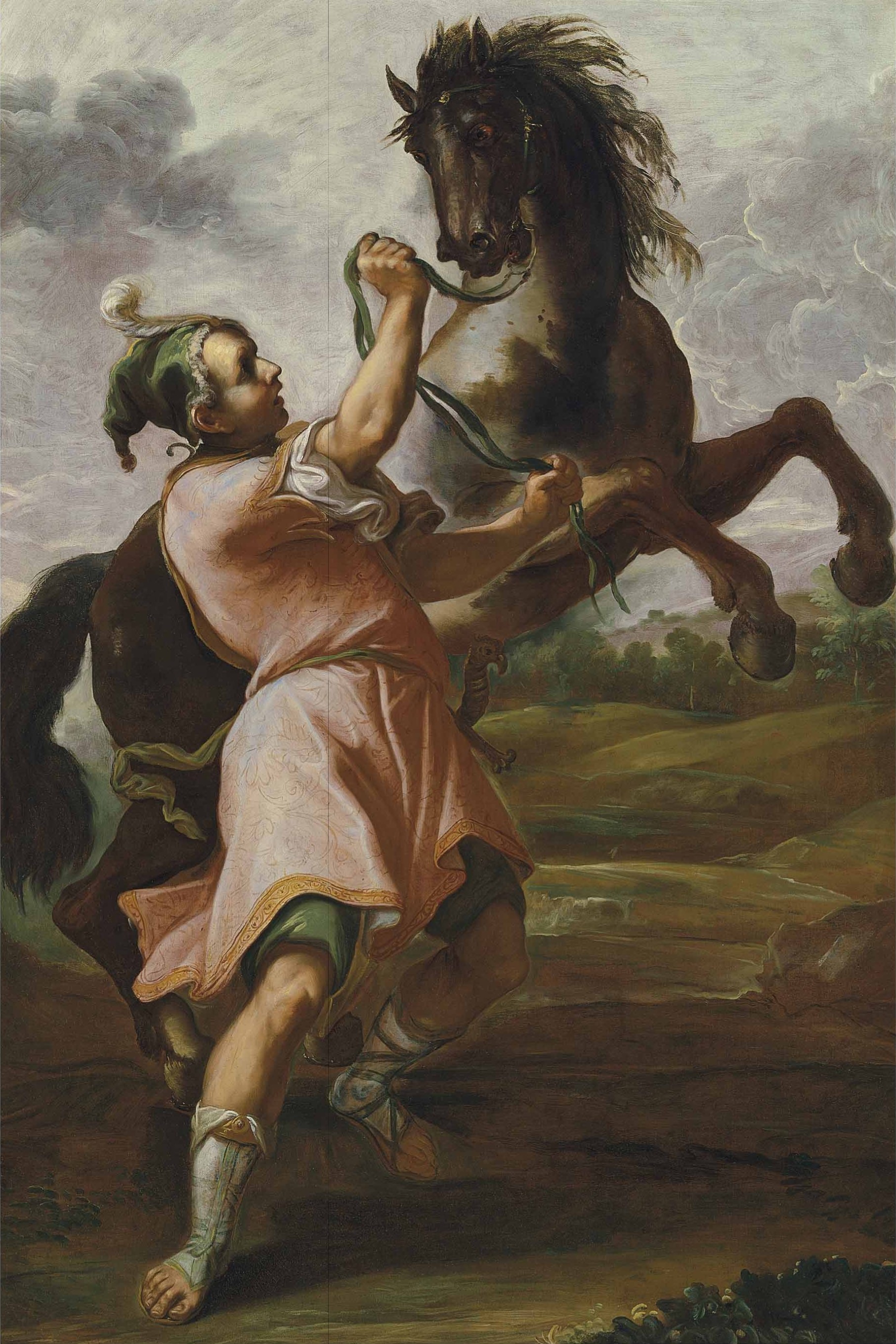Bucephalus (other) on:
[Wikipedia]
[Google]
[Amazon]
Bucephalus (; grc, Βουκεφᾰ́λᾱς, translit=Būcephắlās; – June 326 BC) or Bucephalas, was the horse of Alexander the Great, and one of the most famous horses of classical antiquity. According to the '' Alexander Romance'' (1.15), the name "Bucephalus" literally means "ox-headed" (from and ), and supposedly comes from a brand (or scar) on the thigh of the horse that looked like an ox's head.
Ancient historical accounts state that Bucephalus's breed was that of the "best Thessalian strain", and that he died in what is now Punjab, Pakistan, after the Battle of the Hydaspes in 326 BC. Alexander was so grieved at the loss of his horse that he named one of the many cities he founded after him, as
 A massive creature with a massive head, Bucephalus is described as having a black coat with a large white star on his brow. He is also supposed to have had a "
A massive creature with a massive head, Bucephalus is described as having a black coat with a large white star on his brow. He is also supposed to have had a "

 As one of his chargers, Bucephalus served Alexander in numerous battles.
The value which Alexander placed on Bucephalus emulated his hero and supposed ancestor Achilles, who claimed that his horses were "known to excel all others—for they are immortal. Poseidon gave them to my father Peleus, who in his turn gave them to me."
As one of his chargers, Bucephalus served Alexander in numerous battles.
The value which Alexander placed on Bucephalus emulated his hero and supposed ancestor Achilles, who claimed that his horses were "known to excel all others—for they are immortal. Poseidon gave them to my father Peleus, who in his turn gave them to me."
Alexandria Bucephalus
Alexandria Boukephala and Alexandria Nikaia were two cities founded by Alexander the Great during his invasion of the Indian subcontinent. Two of many cities founded by the Macedonian king, the cities were founded on either side of the Hydaspes ...
.
Taming of Bucephalus
wall eye
Strabismus is a vision disorder in which the eyes do not properly align with each other when looking at an object. The eye that is focused on an object can alternate. The condition may be present occasionally or constantly. If present during ...
" (blue eye), and his breeding was that of the "best Thessalian strain".
Plutarch says in 344 BC, at twelve or thirteen years of age, Alexander of Macedonia
Macedonia most commonly refers to:
* North Macedonia, a country in southeastern Europe, known until 2019 as the Republic of Macedonia
* Macedonia (ancient kingdom), a kingdom in Greek antiquity
* Macedonia (Greece), a traditional geographic reg ...
won the horse by making a wager with his father:Arthur Hugh Clough
Arthur Hugh Clough ( ; 1 January 181913 November 1861) was an English poet, an educationalist, and the devoted assistant to Florence Nightingale. He was the brother of suffragist Anne Clough and father of Blanche Athena Clough who both became p ...
(editor), John Dryden (translator), ''Plutarch's 'Lives, vol. II, Modern Library
The Modern Library is an American book publishing imprint and formerly the parent company of Random House. Founded in 1917 by Albert Boni and Horace Liveright as an imprint of their publishing company Boni & Liveright, Modern Library became an ...
, 2001
The September 11 attacks against the United States by Al-Qaeda, which Casualties of the September 11 attacks, killed 2,977 people and instigated the global war on terror, were a defining event of 2001. The United States led a Participants in ...
. a horse dealer named Philonicus the Thessalian offered Bucephalus to King Philip II for the remarkably high sum of 13 talents. Because no one could tame the animal, Philip was not interested. However, Alexander was, and he offered to pay himself should he fail.
Alexander was given a chance and surprised all by subduing the horse. He spoke soothingly to the horse and turned its head toward the sun so that it could no longer see its own shadow, which had been the cause of its distress. Dropping his fluttering cloak as well, Alexander successfully tamed the horse. Plutarch says that the incident so impressed Philip that he told the boy, "O my son, look thee out a kingdom equal to and worthy of thyself, for Macedonia is too little for thee." Philip's speech strikes the only false note in the anecdote, according to A. R. Anderson, who noted his words as the embryo of the legend fully developed in the ''History of Alexander the Great'' I.15, 17.
The '' Alexander Romance'' presents a mythic variant of Bucephalus's origin. In this tale, the colt, whose heroic attributes surpassed even those of Pegasus
Pegasus ( grc-gre, Πήγασος, Pḗgasos; la, Pegasus, Pegasos) is one of the best known creatures in Greek mythology. He is a winged divine stallion usually depicted as pure white in color. He was sired by Poseidon, in his role as hor ...
, is bred and presented to Philip on his own estate
Estate or The Estate may refer to:
Law
* Estate (law), a term in common law for a person's property, entitlements and obligations
* Estates of the realm, a broad social category in the histories of certain countries.
** The Estates, representat ...
s. The mythic attributes of the animal are further reinforced in the romance by the Delphic Oracle
Pythia (; grc, Πυθία ) was the name of the high priestess of the Temple of Apollo at Delphi. She specifically served as its oracle and was known as the Oracle of Delphi. Her title was also historically glossed in English as the Pythoness ...
who tells Philip that the destined king of the world will be the one who rides Bucephalus, a horse with the mark of the ox's head on his haunch.
Alexander and Bucephalus

 As one of his chargers, Bucephalus served Alexander in numerous battles.
The value which Alexander placed on Bucephalus emulated his hero and supposed ancestor Achilles, who claimed that his horses were "known to excel all others—for they are immortal. Poseidon gave them to my father Peleus, who in his turn gave them to me."
As one of his chargers, Bucephalus served Alexander in numerous battles.
The value which Alexander placed on Bucephalus emulated his hero and supposed ancestor Achilles, who claimed that his horses were "known to excel all others—for they are immortal. Poseidon gave them to my father Peleus, who in his turn gave them to me."
Arrian
Arrian of Nicomedia (; Greek: ''Arrianos''; la, Lucius Flavius Arrianus; )
was a Greek historian, public servant, military commander and philosopher of the Roman period.
''The Anabasis of Alexander'' by Arrian is considered the best ...
states, with Onesicritus as his source, that Bucephalus died at the age of thirty. Other sources, however, give as the cause of death not old age or weariness, but fatal injuries at the Battle of the Hydaspes (June 326 BC), in which Alexander's army defeated King Porus. Alexander promptly founded a city, Bucephala, in honour of his horse. It was on the west bank of the Hydaspes river
The Jhelum River (/dʒʰeːləm/) is a river in the northern Indian subcontinent. It originates at Verinag and flows through the Indian administered territory of Jammu and Kashmir, to the Pakistani-administered territory of Kashmir, and then ...
(modern-day Jhelum
Jhelum ( Punjabi and ur, ) is a city on the east bank of the Jhelum River, which is located in the district of Jhelum in the north of Punjab province, Pakistan. It is the 44th largest city of Pakistan by population. Jhelum is known for p ...
in Pakistan). The modern-day town of Jalalpur Sharif, outside Jhelum, is said to be where Bucephalus is buried.
The legend of Bucephalus grew in association with that of Alexander, beginning with the fiction that they were born simultaneously: some of the later versions of the '' Alexander Romance'' also synchronized the hour of their death.Andrew Runni Anderson, "Bucephalas and His Legend" ''The American Journal of Philology'' 51.1 (1930:1–21). The Bucephalus appears in almost all versions of the '' Armenian Alexander Romance'', and visual illustrations in the surviving manuscripts of this text sometimes represent scenes with the Bucephalus.
See also
*List of historical horses
This list includes actual horses that exist in the historical record. For fictional horses, see: List of fictional horses.
Racehorses
A
* Adios Butler: famous harness racer
* Affirmed: U.S. Triple Crown winner (1978)
* Ajax: 18 consecutive ra ...
* List of fictional horses
This is a list of horses and ponies in fictional subjects, excluding hybrid fantasy creatures such as centaurs and unicorns but including pegasi; their cousins, donkeys and zebras; and cross-breed mules and zebroids.
Horses in literature
*Abe ...
References
External links
* {{Authority control Ancient individual animals Alexander the Great Alexander the Great in legend Ancient Greece History of Punjab Individual warhorses Individual male horses